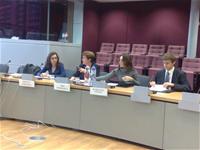Macroeconomics of disasters
Adelina Marini, January 4, 2011
 I have never thought before about the macroeconomic consequences of natural and other disasters. In the beginning of 2010 when a devastating earthquake hit Haiti the only thing that crossed my mind then (and probably many other people) was that it was a humanitarian catastrophe. I could not imagine living through a loss of my home, of the school of my children, my working place, even my government (good or bad, after all a state without a government is a tragedy). But after a meeting with EU Commissioner on humanitarian aid and crisis response, Kristalina Georgieva (to be pronounced Christalina Gheorghieva), I thought about disasters' economic impact.
I have never thought before about the macroeconomic consequences of natural and other disasters. In the beginning of 2010 when a devastating earthquake hit Haiti the only thing that crossed my mind then (and probably many other people) was that it was a humanitarian catastrophe. I could not imagine living through a loss of my home, of the school of my children, my working place, even my government (good or bad, after all a state without a government is a tragedy). But after a meeting with EU Commissioner on humanitarian aid and crisis response, Kristalina Georgieva (to be pronounced Christalina Gheorghieva), I thought about disasters' economic impact.
Human factor
You probably remember the strong earthquake that hit Turkey several years ago. Then hundreds of people were left without shelter, many died and even more were injured. After the initial shock, the analyses about the reasons for the big damages started to emerge. It was proved that the bad standards in construction (mainly new buildings - after 1990) were the reason for the many victims and damages. Even then I asked myself what if (God forbid) such an earthquake would happen in my home country too, what part of the new buildings (after 1989) would sustain it and how many people might remain homeless, who have paid dearly for their new home?
This is why at a meeting in Brussels in the beginning of December I asked  commissioner Georgieva, who before that explained that she liked more dealing with prevention then disasters, whether there was an analysis showing what part of the disasters was due bad standards, bad infrastructure and lack of maintenance. Unfortunately she could not give me an answer but she liked the question and promised to dig deeper into it. However, Georgieva recalled that it was Turkey that made such an analysis precisely after the strong earthquake - an analysis that showed to what extent the high mortality rates and great damages were due to bad standards.
commissioner Georgieva, who before that explained that she liked more dealing with prevention then disasters, whether there was an analysis showing what part of the disasters was due bad standards, bad infrastructure and lack of maintenance. Unfortunately she could not give me an answer but she liked the question and promised to dig deeper into it. However, Georgieva recalled that it was Turkey that made such an analysis precisely after the strong earthquake - an analysis that showed to what extent the high mortality rates and great damages were due to bad standards.
She remembered about another country that had made such an analysis - China after the strong earthquake a little before the Olympic games there. And one more thing she emphasized: "And after making this analysis people took measures. The Chinese took from the EU ... we have an agency that deals precisely with creating standards, including for earthquake-prone areas - they directly took the standards just like we had prepared them in order to apply them in China".
And why is such an analysis important?
 Because it helps extremely much in prevention and last but not least - it saves money. For example, for 2009 the European Union had spent over 930 mn euros (almost a billion) in humanitarian assistance for disaster response in over 60 countries. By the beginning of December 2010, the money reached 800 mn euro and it was expected more to be spent. Of course, for cases like in Haiti and also the floods in Pakistan, it is not very correct money to be calculated per year as the impact from such disasters is indeed huge and a lot of years to come they would need assistance. Especially in Haiti the situation is further deteriorated by political instability. And as Commissioner Georgieva admitted - the crisis situation there is due to a series of bad governments that ruled the country for decades.
Because it helps extremely much in prevention and last but not least - it saves money. For example, for 2009 the European Union had spent over 930 mn euros (almost a billion) in humanitarian assistance for disaster response in over 60 countries. By the beginning of December 2010, the money reached 800 mn euro and it was expected more to be spent. Of course, for cases like in Haiti and also the floods in Pakistan, it is not very correct money to be calculated per year as the impact from such disasters is indeed huge and a lot of years to come they would need assistance. Especially in Haiti the situation is further deteriorated by political instability. And as Commissioner Georgieva admitted - the crisis situation there is due to a series of bad governments that ruled the country for decades.
A day earlier (a group of Bulgarian journalists met Kristalina Georgieva on December 7th) the Bulgarian Commissioner spoke to IMF's president Dominique Strauss-Kahn, with whom she discussed the risks related to conflicts and disasters, as well as the macroeconomic factor. As a leading World Bank economist before she became a commissioner, Ms Georgieva was much aware that risks were a macroeconomic factor. She shared with us that she and Mr Strauss-Kahn had agreed to work in 2011 precisely on this issue.
How, though, can this happen?
At a EU level what can be done is all member states to make their own risk  assessments so that they could be judged collectively. Most people in the Union share the opinion that more should be invested regionally, within the EU and globally because, as Ms Georgieva explained "when we look at the risks only through the prism of our country, most certainly we do not see everything that is on the horizon and the exchange of expertise in risk assessment must be bigger". It was no accident that the General Affairs Council of the EU approved on December 8th Commission's Communication for "A Stronger European Disaster Response: the role of civil protection and humanitarian aid".
assessments so that they could be judged collectively. Most people in the Union share the opinion that more should be invested regionally, within the EU and globally because, as Ms Georgieva explained "when we look at the risks only through the prism of our country, most certainly we do not see everything that is on the horizon and the exchange of expertise in risk assessment must be bigger". It was no accident that the General Affairs Council of the EU approved on December 8th Commission's Communication for "A Stronger European Disaster Response: the role of civil protection and humanitarian aid".
In their conclusions EU's foreign ministers welcome the Commission's decision to merge DG Echo's crisis centre with the Monitoring Information Centre. The small crisis centre works for now after the following principle: when there is a disaster signal somewhere around the world, via a special internal online system a message is being sent to all EU member states and each one estimates how to help. The centre plays a coordinating role by accepting the offers of member states and coordinating the transport of the teams or assistance to the suffering country. All this is being paid by EU's budget for crisis response.
 However, a potential problem are countries with bad infrastructure like Bulgaria. Although she spoke highly favourably about the organisation of Bulgarian civil protection, Ms Georgieva admitted that one of the greatest problems of her homeland is bad infrastructure, making difficult the arrival of help. And if now Bulgaria finds it hard to invest money in building or modernising its roads, what would happen if there is a disaster?! By the way, for several years now floods have become more and more frequent in Bulgaria.
However, a potential problem are countries with bad infrastructure like Bulgaria. Although she spoke highly favourably about the organisation of Bulgarian civil protection, Ms Georgieva admitted that one of the greatest problems of her homeland is bad infrastructure, making difficult the arrival of help. And if now Bulgaria finds it hard to invest money in building or modernising its roads, what would happen if there is a disaster?! By the way, for several years now floods have become more and more frequent in Bulgaria.
The lack of responsibility of municipalities, state and institutions for regular health-checks of reservoirs, dams, river banks and beds, for clearing shafts on city streets and a lot more other things, creates the feeling that Bulgaria might be relatively well prepared to respond but is not prepared at all to prevent a disaster. And reactions, as we well know, always cost more dearly than prevention.
And prevention would be especially necessary against the backdrop of the severe  forecasts. According to Kristalina Georgieva 2010 was the severest year so far in terms of a balance of disasters - overall 170 bn euro of damages only in 2010, given that the average value is between 70 and 80 billion. Victims were 270,000 for 2010, while the average number is 25 thousand. And Kristalina Georgieva sadly reminded where the increase came from - Haiti, Chile, Eyjafjallajoekull, the Mexican bay disaster, the drought in Sahara, the fires in Russia, the failure in Hungary, now the cholera in Haiti, the fires in Israel. And precisely during our visit, the crisis centre was working on securing assistance for the floods in Albania. A long list of terrible disasters which would become even more in the years to come because of climate change and its persistent denial.
forecasts. According to Kristalina Georgieva 2010 was the severest year so far in terms of a balance of disasters - overall 170 bn euro of damages only in 2010, given that the average value is between 70 and 80 billion. Victims were 270,000 for 2010, while the average number is 25 thousand. And Kristalina Georgieva sadly reminded where the increase came from - Haiti, Chile, Eyjafjallajoekull, the Mexican bay disaster, the drought in Sahara, the fires in Russia, the failure in Hungary, now the cholera in Haiti, the fires in Israel. And precisely during our visit, the crisis centre was working on securing assistance for the floods in Albania. A long list of terrible disasters which would become even more in the years to come because of climate change and its persistent denial.
 What is known yet from now for 2011 is a continued commitment in Sudan, where it is expected a referendum to be held related to a possible division of the country, meaning more problems could be expected; Congo, where 1.9 mn people live in camps; Palestinian territories - 1.1 people need humanitarian assistance. Help for Haiti and Pakistan will continue too. And, as the commissioner said about humanitarian aid, "these are only the things which we know about, and what else is waiting out there we have no idea". In 2011 it is also expected the Commission to come up with legislation for a European response to disasters, after the General Affairs Council has approved the relevant Communication.
What is known yet from now for 2011 is a continued commitment in Sudan, where it is expected a referendum to be held related to a possible division of the country, meaning more problems could be expected; Congo, where 1.9 mn people live in camps; Palestinian territories - 1.1 people need humanitarian assistance. Help for Haiti and Pakistan will continue too. And, as the commissioner said about humanitarian aid, "these are only the things which we know about, and what else is waiting out there we have no idea". In 2011 it is also expected the Commission to come up with legislation for a European response to disasters, after the General Affairs Council has approved the relevant Communication.